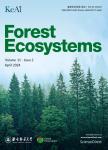Effects of firewood harvesting intensity on biodiversity and ecosystem services in shrublands of northern Patagonia
Effects of firewood harvesting intensity on biodiversity and ecosystem services in shrublands of northern Patagonia作者机构:Universidad Nacional de Río NegroInstituto de Investigaciones en Recursos NaturalesAgroecología y Desarrollo RuralSan Carlos de BarilocheRío NegroArgentina. Consejo Nacional de Investigaciones Científicas y TécnicasInstituto de Investigaciones en Recursos NaturalesAgroecología y Desarrollo RuralSan Carlos de BarilocheRío NegroArgentina. Laboratorio EcotonoINIBIOMACONICET-Universidad Nacional del ComahueSan Carlos de BarilocheRío NegroArgentina.
出 版 物:《Forest Ecosystems》 (森林生态系统(英文版))
年 卷 期:2020年第7卷第4期
页 面:621-634页
核心收录:
学科分类:09[农学] 0903[农学-农业资源与环境]
基 金:Agencia Nacional de Promoción Científica y Tecnológica–Argentina(PICT 2013–1079 and PICT 2016–0305) a CONICET scholarship to the first author
主 题:Temperate forest ecosystems Disturbance intensity Plant diversity Ecosystem services
摘 要:Background: Forest management has historically focused on provisioning of goods (e.g. timber, biomass), butthere is an increasing interest to manage forests also to maintain biodiversity and to provide other ecosystemservices (ES).Methods: We evaluated the effects of firewood harvesting intensity on biodiversity and different ES in threecontrasting shrubland sites in northern Patagonia (Argentina). At each site, four harvesting treatments, representingvarious levels of harvest intensity, were randomly assigned to eight permanent sample plots of 31.5m× 45 mduring 2013–***: We found that the effects of increasing harvesting intensity on plant diversity changed from negative topositive (and from nonlinear to more linear responses) with increasing site productivity. Harvesting intensityshowed contrasting effects on variables related to fire protection ecosystem service, since it reduced fuel amount(potentially reducing fire spread) but also reduced live fuel moisture content (potentially increasing flammability) atthe three sites. Two variables related to soil formation and protection ES, leaf litter cover and aerial soil cover,decreased with harvesting intensity at the three ***: We conclude that shrubland management for firewood production may enhance biodiversity withoutcompromising certain important ES. The intensity of harvesting should be determined according to site conditionsand forecasted impacts on biodiversity, fire and soil formation and protection.



